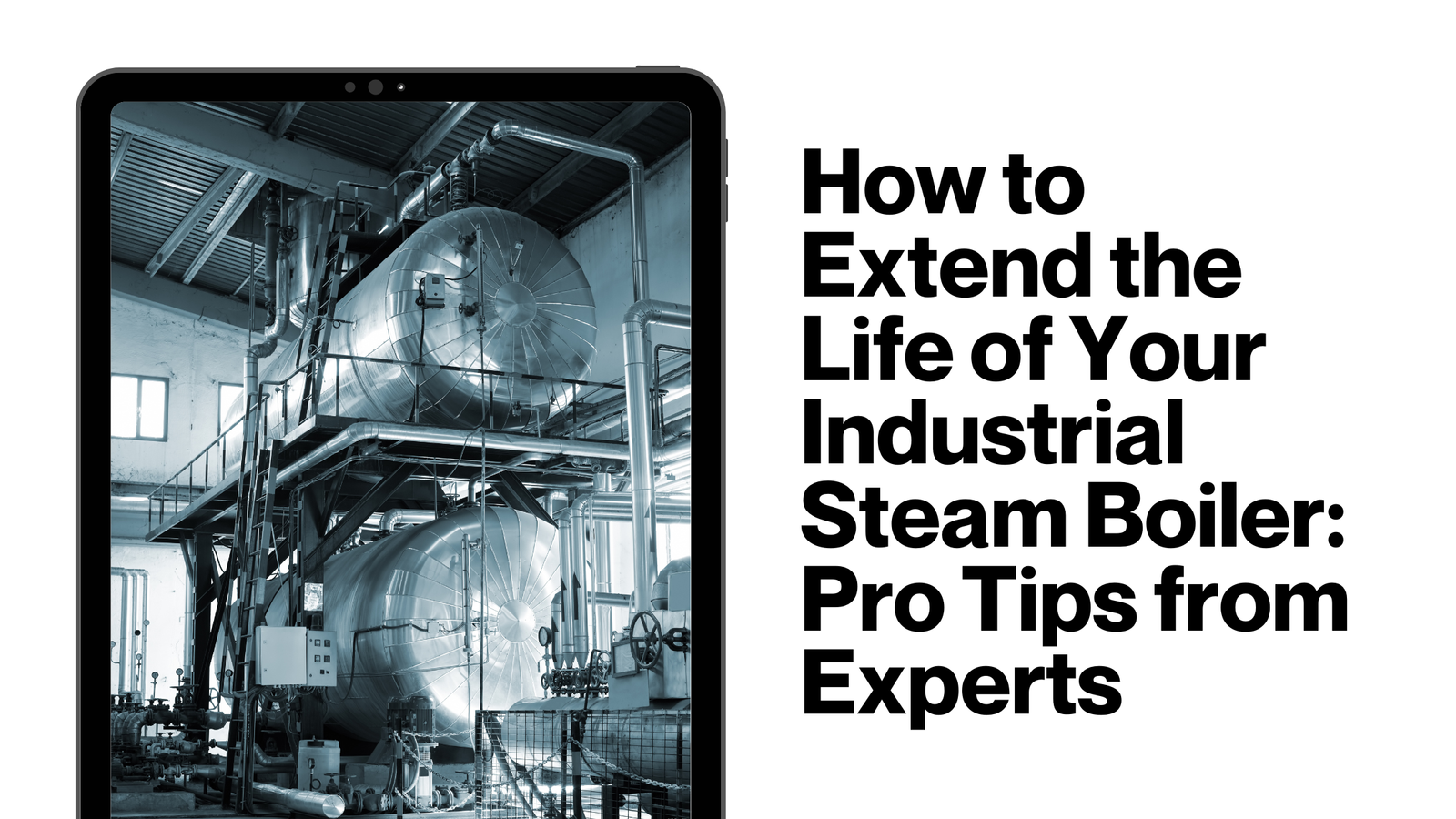
Industrial steam boilers are the unsung heroes of countless industries. From dairy processing plants to textile mills and power generation units, boilers quietly keep operations running by producing the steam and heat that fuel production. But while they’re built to handle tough conditions, they aren’t indestructible.
A new industrial steam boiler represents a significant investment—one that most businesses would prefer not to repeat every few years. The good news? With the right maintenance and operating practices, a boiler that’s typically expected to last 20 years can often run efficiently for 30 years or more. That’s a decade of extra value, energy savings, and uninterrupted productivity.
So how do you make that happen? Here’s what experts recommend if you want to maximize the lifespan of your industrial steam boiler.
Understanding the Lifespan of Industrial Steam Boilers
Most industrial steam boilers last 20 to 30 years under normal conditions. Some robust, well-maintained units can reach 40 years of service. The difference between a boiler that fails in 10 years versus one that lasts decades often comes down to four major factors:
- Design and fabrication quality – Premium steel and reliable welding extend durability.
- Operating hours – Boilers that run around the clock naturally wear faster than those used seasonally.
- Maintenance practices – Preventive care keeps small issues from turning into big failures.
- Water and fuel quality – Contaminants in water or fuel are silent killers of boiler performance.
Think of your boiler as a high-performance engine. Without regular care, it will eventually burn out, but with consistent attention, it can deliver reliable output for decades.
Why Regular Boiler Maintenance is Non-Negotiable
Skipping boiler maintenance is a gamble few industries can afford. Unchecked issues don’t just shorten equipment life—they can lead to dangerous failures, unplanned shutdowns, and production losses that cost far more than routine care ever would.
Daily and Weekly Checks that Extend Life
Operators should treat daily checks as a standard ritual. These include:
- Recording steam pressure, temperature, and water levels.
- Performing blowdowns to flush out sediment that can build up inside the system.
- Inspecting safety valves to ensure they release pressure correctly.
Weekly inspections might involve testing low-water cutoffs and observing flame conditions. These steps may seem small, but they add up to long-term boiler health.
Monthly and Annual Maintenance Essentials
Longer intervals call for deeper inspections, such as:
- Internal tube cleaning and descaling to prevent blockages.
- Checking refractory material for cracks or damage.
- Calibrating gauges and testing water treatment chemicals.
- Performing a full internal and external inspection with certified professionals at least once a year.
Neglecting even one of these areas can accelerate wear and tear, leading to reduced efficiency and early replacement.
Water Quality: The Silent Destroyer of Boilers
One of the fastest ways to kill a boiler is to ignore water quality. Minerals, dissolved gases, and impurities corrode internal surfaces and create hard scale deposits that act like insulation, forcing the boiler to work harder.
Common problems caused by poor water quality include:
- Scaling: Mineral deposits reduce heat transfer efficiency.
- Corrosion: Oxygen in water eats away at boiler tubes.
- Foaming and carryover: Impurities cause water droplets to be carried into steam lines, damaging downstream equipment.
Solutions for Better Water Quality
- Water softeners: Remove calcium and magnesium that cause scaling.
- Deaerators: Strip oxygen and carbon dioxide from feedwater.
- Chemical treatment programs: Control pH levels and prevent corrosion.
- Regular water testing: Ensures treatment systems are working effectively.
Think of water treatment as health insurance for your boiler—it might seem like an added cost, but it saves you from paying far more in premature failures.
Boosting Boiler Efficiency for Long-Term Performance
An efficient boiler is a reliable boiler. When it operates optimally, it consumes less fuel, reduces wear on components, and produces steam consistently. The long-term benefits of properly maintained boilers are well illustrated in the article Steam Boilers Shaped Industries, showing how efficiency improvements can extend equipment life and enhance industrial productivity.
Practical steps include:
- Combustion tuning: Adjusting the air-fuel ratio prevents wasted fuel and reduces stress.
- Installing economizers: Capturing waste heat from flue gases to preheat feedwater saves energy and reduces strain.
- Avoiding short-cycling: Repeated on-off cycles wear out controls and burners.
- Proper insulation: Insulating steam lines and tanks reduces energy loss and workload on the boiler.
Efficiency upgrades don’t just cut utility bills—they add years to your boiler’s operational life.
Best Practices for Boiler Operation
A common mistake plants make is investing in expensive equipment but not in operator training. The truth is, the way a boiler is handled daily can determine whether it thrives or fails early.
Start-Up and Shutdown Procedures Matter
Rapid temperature swings create thermal stress, leading to cracked tubes and warped metal. Boilers should be warmed up gradually and cooled down slowly to avoid structural damage.
Skilled Operators Keep Boilers Alive Longer
Well-trained staff can detect unusual noises, vibrations, or shifts in performance before they turn into full-scale breakdowns. Regular refresher training ensures operators remain sharp and up-to-date with safety standards.
Upgrading and Retrofitting: A Path to Longevity
Just because a boiler is old doesn’t mean it’s outdated. Retrofitting with modern controls or IoT-based monitoring systems can transform a decades-old unit into a more efficient, safer machine.
Examples of smart upgrades include:
- Automated control systems for precise combustion adjustments.
- Advanced monitoring sensors to track efficiency and predict failures.
- Low-NOx burners that improve fuel efficiency and reduce emissions.
These investments extend the life of existing equipment while delivering better performance.
Safety Measures That Protect Your Boiler
Safety is not just about compliance—it directly impacts boiler longevity. A system that suffers from frequent overpressure events, leaks, or unsafe operating conditions will deteriorate faster.
Key measures include:
- Testing overpressure protection systems regularly.
- Using leak detection sensors to spot hidden problems early.
- Developing an emergency shutdown plan so staff know how to act quickly.
The safest boilers are often the longest-lasting ones.
Repair or Replace: Knowing the Right Time
At some point, even the best care won’t stop natural wear and tear. The challenge for plant managers is knowing when to keep repairing and when to invest in a replacement.
Signs it may be time to replace include:
- Repairs becoming more frequent and costly.
- Efficiency declining despite tune-ups and cleaning.
- Safety concerns due to metal fatigue, leaks, or outdated controls.
Modern boilers may require upfront investment, but the long-term savings in energy, reliability, and safety often outweigh the cost of endless repairs.
Expert Recommendations for Extending Boiler Life
Veterans in the field consistently point to a few universal practices that extend boiler lifespan:
- Keep detailed maintenance logs to track inspections and service history.
- Stock critical spare parts like gaskets, valves, and seals to minimize downtime.
- Schedule third-party inspections for unbiased assessments.
- Partner with experienced boiler service providers for tailored care programs.
These steps create a proactive culture around boiler maintenance rather than a reactive one.
Keep Your Boiler Working for Decades—Not Just Years
Your industrial steam boiler is more than just machinery—it’s the backbone of your production. By prioritizing routine care, maintaining water quality, and seeking guidance from a trusted steam boiler manufacturer in Dubai, UAE, you can extend its lifespan well beyond the average. That means fewer unexpected replacements, safer operations, and steady output for years to come.
Don’t wait until small issues turn into major failures. Schedule a professional inspection and establish a preventive maintenance plan today—the steps you take now could save you millions in downtime and future repair costs.


